Critics slam Board meeting... Dozens challenge Chicago Board of Education lies, incompetence at tumultuous August 26 Chicago meeting
Who is telling the truth? 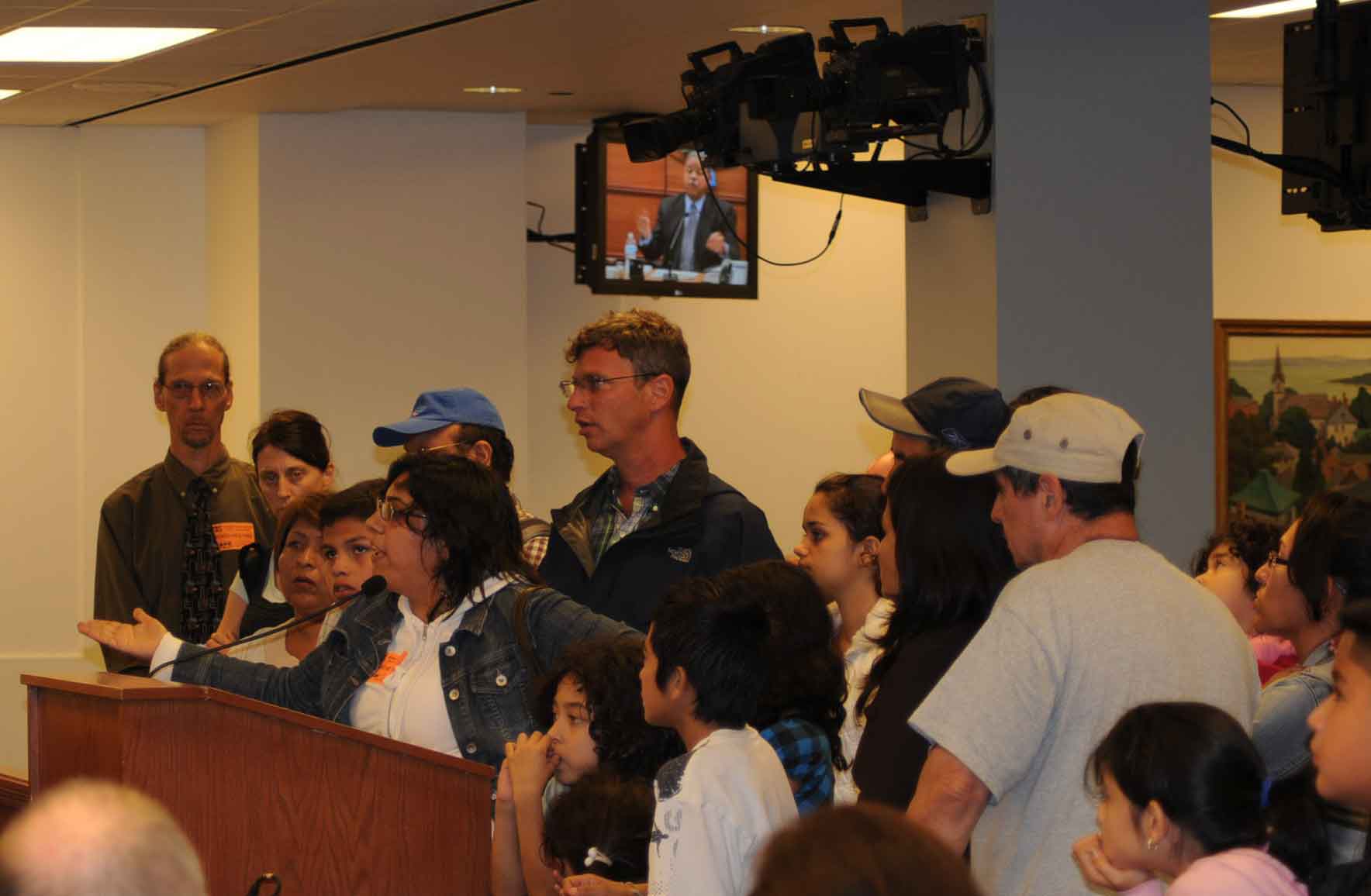 Standing with supporters from CORE, Whittier school, and neighbors (including many children) from Chicago's famous Pilsen community, Emma Gaete (gesturing from podium) of the Pilsen Alliance engaged in a heated debate with Chicago Board of Education President Michael Scott (visible arguing with Gaete on the television monitor above) during the August 26, 2009 Chicago Board of Education meeting. The topic of the disagreement between Scott and Gaete was Scott's promise to locate the controversial UNO 'Octavio Paz' charter school in the Pilsen community's De la Cruz Middle School less than three months after CPS closed De la Cruz, saying it was not worth rehabilitating and that the school was "underutilized." The challenge to Scott's credibility on the question of his favoritism toward charter schools in general and the politically powerful UNO charters in particular was one of several that took place during the meeting. Scott at one point ordered the microphones turned off as Gaete was speaking, but after she was able to continue utilizing her own voice, he ordered the sound system restored. Substance photo by George N. Schmidt. At the August 26, 2009, Chicago Board of Education meeting, a phalanx of community leaders, teachers, parents, and others surrounded Whittier teacher Norine Gutekanst and other speakers who charged that the Board is lying about placing the UNO Charter School temporarily for one year inside the De La Cruz public school. De la Cruz was closed in June 2009 due to low enrollment, what the Board calls "underutilization". At the time of the hearings on the proposed closing of De la Cruz in February 2008, not one speaker spoke in favor of the Board's plan, and De la Cruz staff and parents refuted the Board's own data supposedly justifying the claim.
Standing with supporters from CORE, Whittier school, and neighbors (including many children) from Chicago's famous Pilsen community, Emma Gaete (gesturing from podium) of the Pilsen Alliance engaged in a heated debate with Chicago Board of Education President Michael Scott (visible arguing with Gaete on the television monitor above) during the August 26, 2009 Chicago Board of Education meeting. The topic of the disagreement between Scott and Gaete was Scott's promise to locate the controversial UNO 'Octavio Paz' charter school in the Pilsen community's De la Cruz Middle School less than three months after CPS closed De la Cruz, saying it was not worth rehabilitating and that the school was "underutilized." The challenge to Scott's credibility on the question of his favoritism toward charter schools in general and the politically powerful UNO charters in particular was one of several that took place during the meeting. Scott at one point ordered the microphones turned off as Gaete was speaking, but after she was able to continue utilizing her own voice, he ordered the sound system restored. Substance photo by George N. Schmidt. At the August 26, 2009, Chicago Board of Education meeting, a phalanx of community leaders, teachers, parents, and others surrounded Whittier teacher Norine Gutekanst and other speakers who charged that the Board is lying about placing the UNO Charter School temporarily for one year inside the De La Cruz public school. De la Cruz was closed in June 2009 due to low enrollment, what the Board calls "underutilization". At the time of the hearings on the proposed closing of De la Cruz in February 2008, not one speaker spoke in favor of the Board's plan, and De la Cruz staff and parents refuted the Board's own data supposedly justifying the claim.
During the year-and-a-half between the hearings on the closing of De la Cruz in February 2008 and the final closing of the award winning middle school in June 2009, the suspicion in the community was that the Board planned to give away the building to the UNO charter schools. No sooner was De la Cruz closed than those suspicions were proved true when Board of Education President Michael Scott distributed a letter to some member of the community explaining a supposed "emergency" reason for putting an UNO charter school into the building that had been De la Cruz Middle School. Critics charge that once again the Board is favoring charter schools and helping to undermine neighborhood public schools by placing the UNO charter school inside the De la Cruz facility on a supposedly "emergency" basis.
According to teachers from De la Cruz, the roof was replaced a "few years back." "The new windows were installed shortly before they announced the impending closure, in February 2008," reported one De la Cruz teacher. "The recent improvements made post-closure announcements were 1) the installation of the digital phone system, which required re-wiring much of the building; 2) new light ballasts for all of the lighting inside the building, and 3) the repair of the basement that had been flooding in heavy rains for years..." The basement repairs were done on the last day of school — to a building that Michael Scott and other Board officials were claiming was going to be demolished and the land sold! Prior to the basement repairs, heavy rains would result in two or more inches of water in the building's basement. Once the middle school was out of the building, the basement was waterproofed, although CPS was still claiming (in June 2009) that the building would be scrapped.
“We require you to be truthful,” Gutekanst told Board President Michael Scott. “The Board reports don’t reflect this [one year] time limit.”
Rental is $1 per year for controversial UNO charter school at recently closed De la Cruz building
In addition to getting a building that has been improved greatly once it became clear the the public school was being evicted, UNO is getting a real deal on the rent. In fact, UNO will be paying the lowest rent for any building in the nearby community during the time it occupies the De la Cruz building.
The Board report stated that UNO may rent the building for $1 for a “one year pilot period” after which the tenant (UNO) “may revisit” or change its service to three years.
Clearly displeased, Scott assured the UNO critics that if anything is “inconsistent” in the Board report it will be changed. However, Board attorney Patrick Rocks said the report listed the lease for 1 year, implying there is no inconsistency, though he did not dispute the later clause.
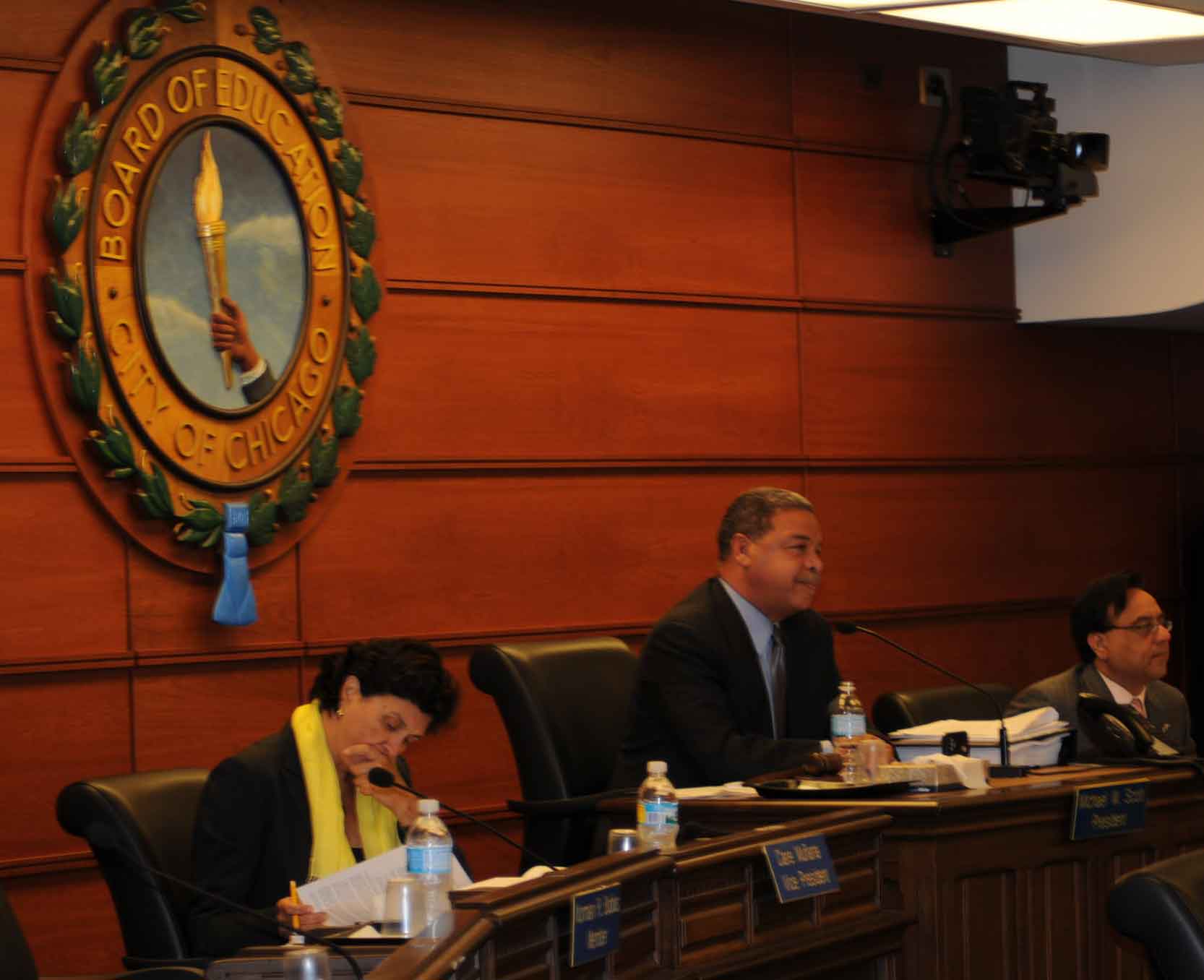 An exasperated Chicago Board of Education President Michael Scott (above, center) showed his anger at being caught lying to the community during the heated discussions over the decision of the Board of Education to close the De la Cruz Middle School (in June 2009) and then quickly flip the building into the hands of the controversial UNO charter schools network. As a result of the heated discussions surrounding the UNO decision, the Chicago Board of Education is supposed to send Board Vice President Clara Muñana (above left, reading) to the Whittier Elementary School, which has been neglected for more than a decade while CPS policy under Scott has favored privatization and charter schools. Muñana, a wealthy international business consultant, is one of the seven members of the Chicago Board of Education. All of them are businessmen and women, not educators, and all vote routinely in favor of privatization and charter schools and against the city's remaining public schools. Substance photo by George N. Schmidt.The Pilsen Alliance together with Whittier elementary school and a growing number of public school activists across Chicago are against moving the UNO charter school into the De La Cruz building. Critics of the UNO plan state Chicago Public Schools officials have long neglected the Whittier building repairs for years while favoring UNO at every turn. Most recently, CPS installed new windows and a new roof after the De La Cruz building, even though they knew they planned to close the De la Cruz building. The De la Cruz Middle School was closed, only to then be handed over to the powerful Latino charter operator, UNO (United Neighborhood Organizations). UNO has recently received $98 million from the state to open more charter schools.
An exasperated Chicago Board of Education President Michael Scott (above, center) showed his anger at being caught lying to the community during the heated discussions over the decision of the Board of Education to close the De la Cruz Middle School (in June 2009) and then quickly flip the building into the hands of the controversial UNO charter schools network. As a result of the heated discussions surrounding the UNO decision, the Chicago Board of Education is supposed to send Board Vice President Clara Muñana (above left, reading) to the Whittier Elementary School, which has been neglected for more than a decade while CPS policy under Scott has favored privatization and charter schools. Muñana, a wealthy international business consultant, is one of the seven members of the Chicago Board of Education. All of them are businessmen and women, not educators, and all vote routinely in favor of privatization and charter schools and against the city's remaining public schools. Substance photo by George N. Schmidt.The Pilsen Alliance together with Whittier elementary school and a growing number of public school activists across Chicago are against moving the UNO charter school into the De La Cruz building. Critics of the UNO plan state Chicago Public Schools officials have long neglected the Whittier building repairs for years while favoring UNO at every turn. Most recently, CPS installed new windows and a new roof after the De La Cruz building, even though they knew they planned to close the De la Cruz building. The De la Cruz Middle School was closed, only to then be handed over to the powerful Latino charter operator, UNO (United Neighborhood Organizations). UNO has recently received $98 million from the state to open more charter schools.
“We don’t need another charter school in our community because our schools are not overcrowded,” stated Jose Trigueros from Whittier. The reference is to the claim by Scott and other Board officials that the UNO charter schools are being expanded to help "relieve overcrowding" in parts of Chicago's southwest side. Critics have long charged that CPS has deliberately stalled public school expansion across the southwest side to help UNO expand its charter schools. Trigueros also noted one of the paradoxes of the UNO occupation of the De la Cruz building: UNO doesn't encourage dual language work, as does Whittier. “We don’t need a school that does not value the primary language of our children,” he added.
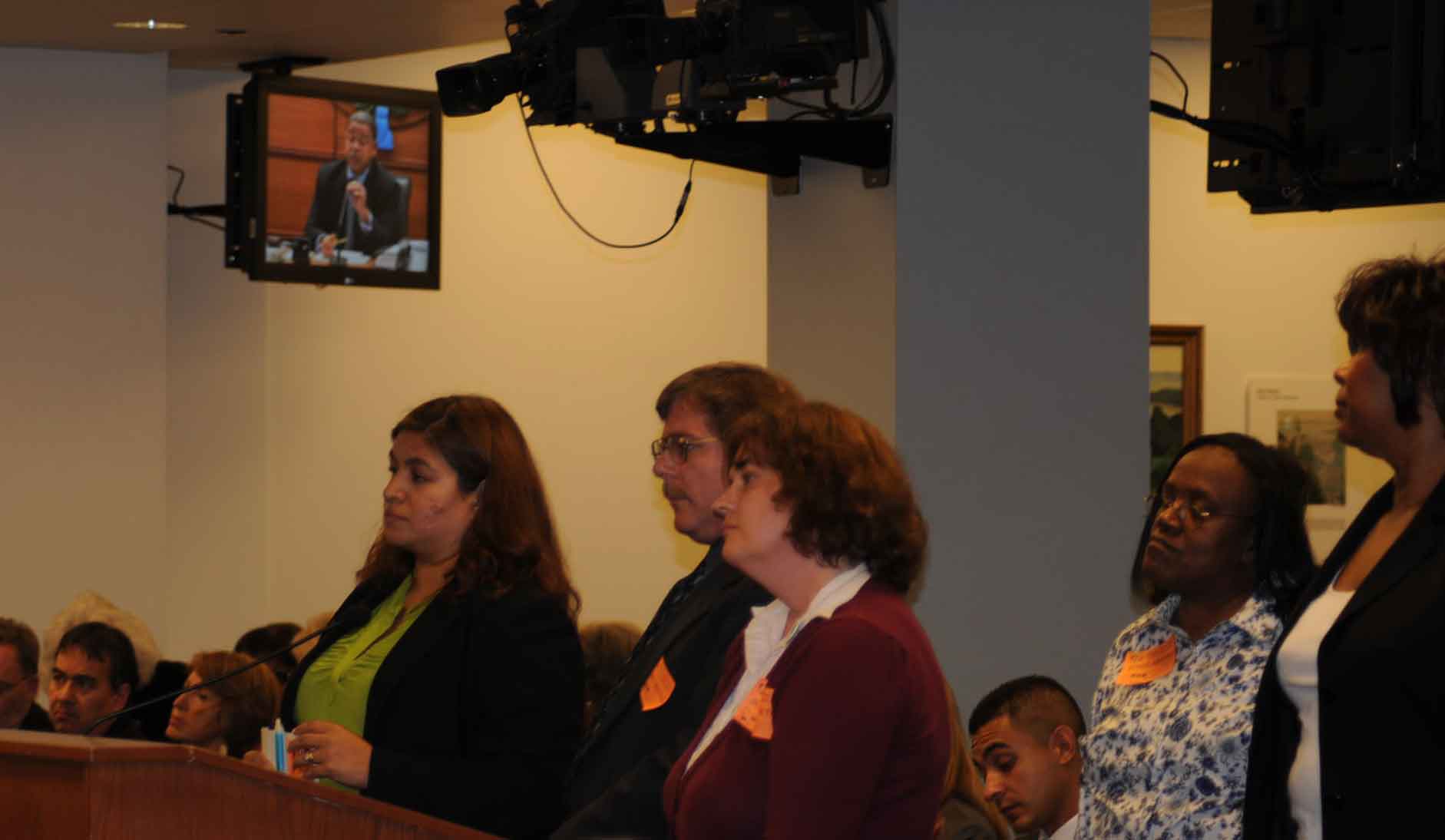 Gunsaulus school parents Virginia Guevara (left) and Neal Suwe (second from left) were joined by supporters when they challenged the Board to remove the school's tyrannical principal. Suwe returned to answer a previous meeting's challenge from Board President Michael Scott that the parents critical of the principal bring evidence -- "data" Scott called it -- that the principal's actions were hurting students. When Suwe presented examples, Scott continued to claim there was nothing CPS could do about problems such as the one at Gunsaulus because the LSC had installed the principal. Scott ignored the fact that the Board of Education would be voting a few hours later to remove two principals. Substance photo by George N. Schmidt.Board Vice President Clara Muñana agreed to come out and visit Whittier school after a parent said the children have to eat in the hallways and the building is in dire need of structural improvements.
Gunsaulus school parents Virginia Guevara (left) and Neal Suwe (second from left) were joined by supporters when they challenged the Board to remove the school's tyrannical principal. Suwe returned to answer a previous meeting's challenge from Board President Michael Scott that the parents critical of the principal bring evidence -- "data" Scott called it -- that the principal's actions were hurting students. When Suwe presented examples, Scott continued to claim there was nothing CPS could do about problems such as the one at Gunsaulus because the LSC had installed the principal. Scott ignored the fact that the Board of Education would be voting a few hours later to remove two principals. Substance photo by George N. Schmidt.Board Vice President Clara Muñana agreed to come out and visit Whittier school after a parent said the children have to eat in the hallways and the building is in dire need of structural improvements.
Gema Gaete, from Pilsen Alliance, followed Gutekanst and told the Board they were lying and being deceitful. She said despite assurance by Board President Michael Scott’s that the UNO stay is only temporary, she heard UNO president Juan Rangel say he plans to buy the building. There was a heated exchange between Gaete and Scott, until Scott then had her microphone turned off.
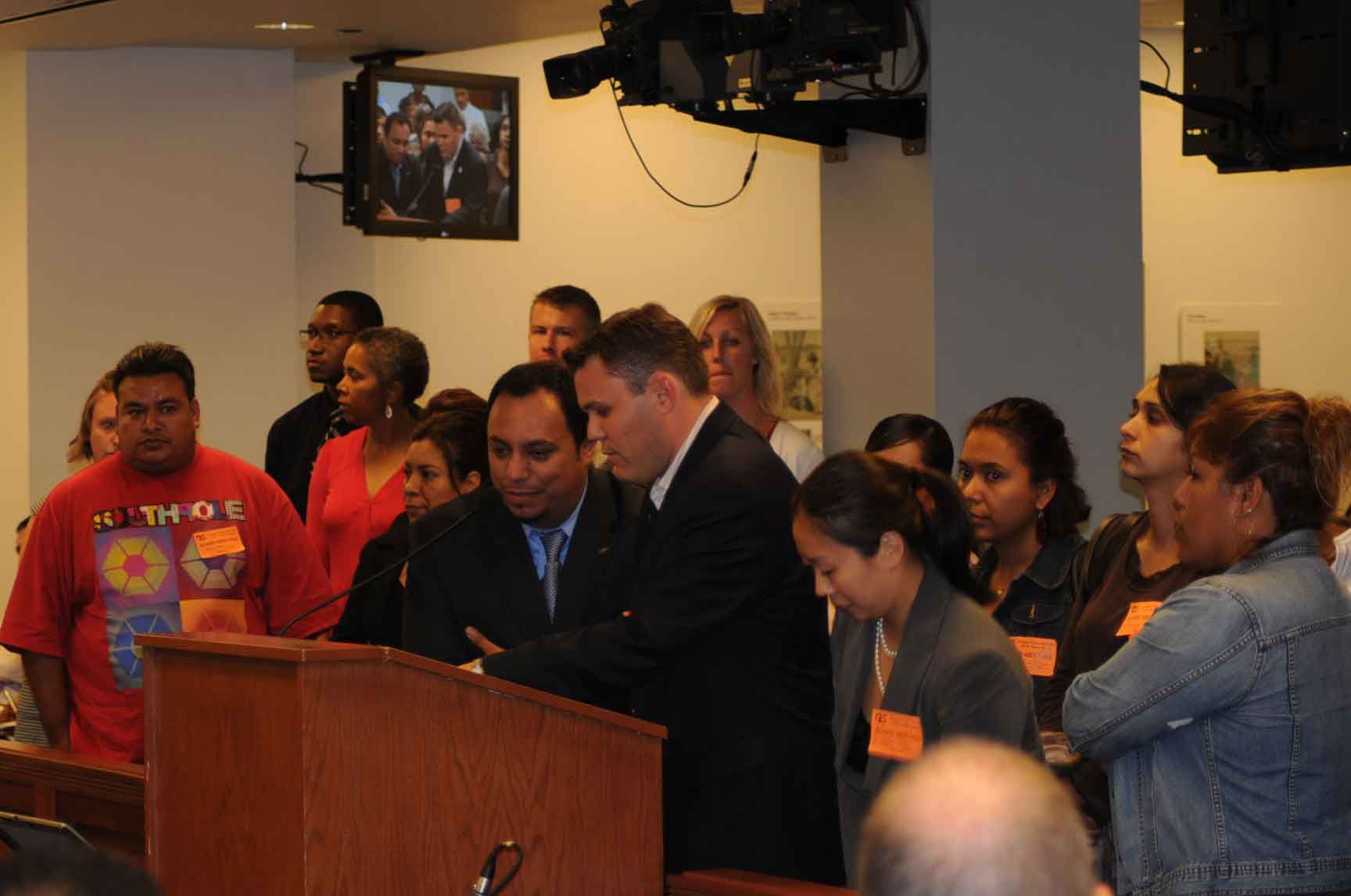 Francisco d'Escoto (above at podium) was called to speak at 5:00 p.m. but didn't approach the podium. Generally, when a speaker does not appear to speak, he has forfeited his right to speak. It turned out that one of the new rules being enforced by Board President Michael Scott at the August 26 Board meeting was something critics have now nicknamed the "UNO Rule." When UNO wants to speak, UNO gets to speak is how it goes. D'Escoto was apparently awaiting the arrival of Juan Rangel (standing with d'Escoto above) and some teachers and students from UNO's Octavio Paz charter school before he spoke. The UNO contingent arrived more than four hours after many of those who had waited in line. Substance photo by George N. Schmidt.Juan Rangel, executive director of UNO, who was standing outside the Board chambers during the heated exchange between Scott and the UNO critics, told Substance he has no plans to stay in the De La Cruz building beyond the one-year lease.
Francisco d'Escoto (above at podium) was called to speak at 5:00 p.m. but didn't approach the podium. Generally, when a speaker does not appear to speak, he has forfeited his right to speak. It turned out that one of the new rules being enforced by Board President Michael Scott at the August 26 Board meeting was something critics have now nicknamed the "UNO Rule." When UNO wants to speak, UNO gets to speak is how it goes. D'Escoto was apparently awaiting the arrival of Juan Rangel (standing with d'Escoto above) and some teachers and students from UNO's Octavio Paz charter school before he spoke. The UNO contingent arrived more than four hours after many of those who had waited in line. Substance photo by George N. Schmidt.Juan Rangel, executive director of UNO, who was standing outside the Board chambers during the heated exchange between Scott and the UNO critics, told Substance he has no plans to stay in the De La Cruz building beyond the one-year lease.
“We plan to build a new school and we’re still looking at property,” Rangel told Substance. “It’s absolutely not true that we plan to buy the building.”
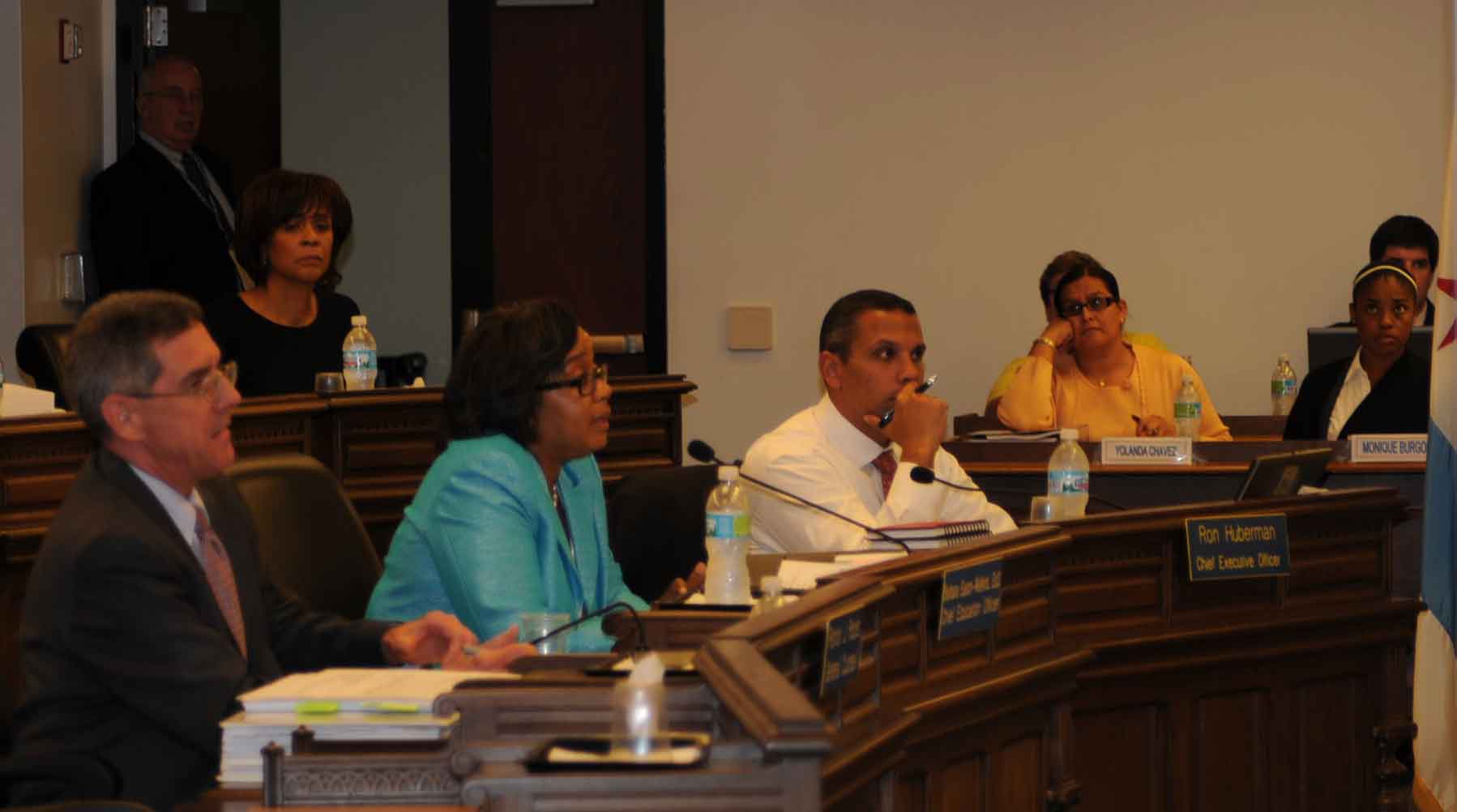 Despite having been humiliated and disrespected on a daily basis by the newly installed administration of "Chief Execuctive Officer" Ron Huberman (above in white shirt with hands to mouth), Chicago's "Chief Education Officer" Barabara Eason-Watkins (above third from left, speaking into the microphone) continues to provide justiciation for every twist and turn of the privatization and other un-democratic policies of CPS. During the Gunsaulus discussion, Easton-Watkins justified the Board's claim that there was nothing CPS could do about the behavior of the principal. Later in the meeting, Rob Huberman would present a budget which was an explicit repudiation of Eason-Watkins's work under former CEO Arne Duncan, and then watch as a reorganization plan created a group of "Chief Area Officers" who did not have to have any teaching or administrative experience in Chicago, nor any Illinois teaching or administrative certification. The largest number of cuts ordered by Huberman came against programs that had been instituted and overseen by Eason-Watkins. Substance photo by George N. Schmidt. The August 26 afternoon Board meeting was certainly rocky for the six Board members (Roxanne Ward was absent) and Chicago Schools chief Ron Huberman as critics lashed out at everything from the budget deficit to neglecting the neighborhood schools due to overcrowding. Scott certainly was on the edge of his seat throughout most of the meeting, while Huberman chose to say very little. Often appearing flustered at being caught in what critics have concluded is a web of past lies, Scott was uncharacteristically short tempered during many of the discussions, according to those who have observed him and the Board over long periods of time.
Despite having been humiliated and disrespected on a daily basis by the newly installed administration of "Chief Execuctive Officer" Ron Huberman (above in white shirt with hands to mouth), Chicago's "Chief Education Officer" Barabara Eason-Watkins (above third from left, speaking into the microphone) continues to provide justiciation for every twist and turn of the privatization and other un-democratic policies of CPS. During the Gunsaulus discussion, Easton-Watkins justified the Board's claim that there was nothing CPS could do about the behavior of the principal. Later in the meeting, Rob Huberman would present a budget which was an explicit repudiation of Eason-Watkins's work under former CEO Arne Duncan, and then watch as a reorganization plan created a group of "Chief Area Officers" who did not have to have any teaching or administrative experience in Chicago, nor any Illinois teaching or administrative certification. The largest number of cuts ordered by Huberman came against programs that had been instituted and overseen by Eason-Watkins. Substance photo by George N. Schmidt. The August 26 afternoon Board meeting was certainly rocky for the six Board members (Roxanne Ward was absent) and Chicago Schools chief Ron Huberman as critics lashed out at everything from the budget deficit to neglecting the neighborhood schools due to overcrowding. Scott certainly was on the edge of his seat throughout most of the meeting, while Huberman chose to say very little. Often appearing flustered at being caught in what critics have concluded is a web of past lies, Scott was uncharacteristically short tempered during many of the discussions, according to those who have observed him and the Board over long periods of time.
Critics still question the Board's claim that it can't do anything about dictatorial principals
After the Board heard its usual "good news" item (always about some organization with corporate Chicago ties that is having a small impact on students somewhere), the public participation portion of the meeting began with two people who because of their office were allowed to speak before the Board began going through the regular sign-in names in order.
The first speaker was a public official, Alderman Tom Allen (38th Ward). Allen told the Board that residents of his ward were dissatisfied with the refusal of the Board to relieve overcrowding at the Reinberg Elementary School (3425 N. Major, with part of the school located at the corner of Roscoe and Central on the city's northwest side). The situation at Reinberg was recently covered at SubstanceNews (see The 'Turnaround' Lies of the Obama Administration in A Tale of Two Cities... Chicago's Reinberg Elementary School suffers overcrowding while privileged few get huge public building, new football field at AUSL's supposed training center for 'turnaround' teachers, By George N. Schmidt - May 29, 2009, available in 'Back Issues' at the top of the May 2009 Home Page of SubstanceNews).
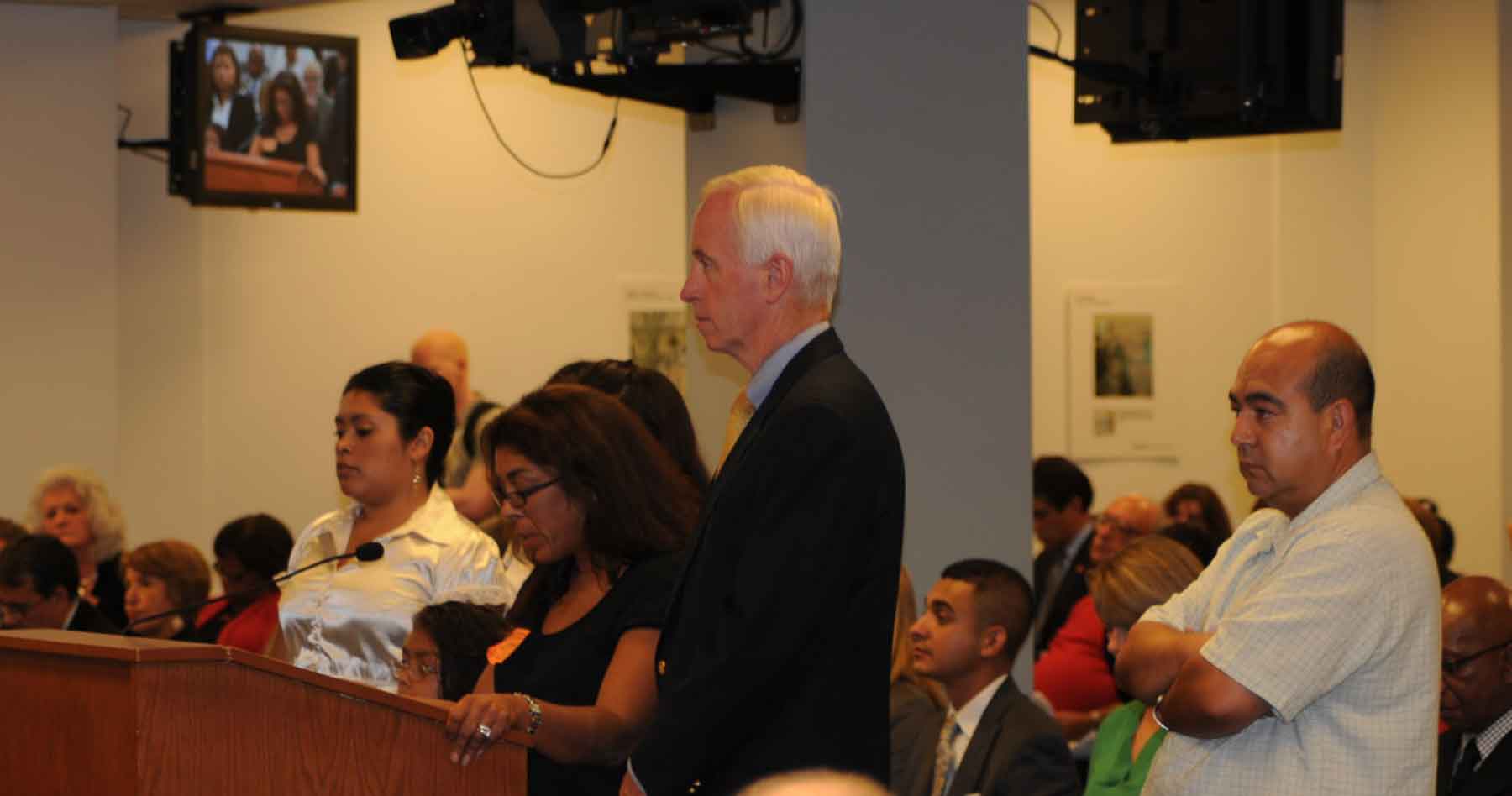 Alderman Tom Allen (38th Ward) told the Board he was disappointed that no action had been taken to relieve the serious overcrowding at Reinberg Elementary School in his ward. Speaking on the topic at the microphone (above) was Reinberg LSC president Adamina Quinones (with glasses), who told the Board that this year Reinberg, with six mobile classrooms to the east of its main building, would have more than 1,400 students, forcing the school to cut back on all but basic programs and to serve lunch under less than best practices conditions. Substance photo by George N. Schmidt.Alderman Allen discussed how frustrating the overcrowding at Reinberg is without mentioning that Mayor Daley had ordered the Board of Education to give the largest school building on the northwest side to the privileged Chicago Academy, rather than allowing the former Wright College building to be used to house a public school that would relieve the overcrowding at Reinberg and other northwest side schools.
Alderman Tom Allen (38th Ward) told the Board he was disappointed that no action had been taken to relieve the serious overcrowding at Reinberg Elementary School in his ward. Speaking on the topic at the microphone (above) was Reinberg LSC president Adamina Quinones (with glasses), who told the Board that this year Reinberg, with six mobile classrooms to the east of its main building, would have more than 1,400 students, forcing the school to cut back on all but basic programs and to serve lunch under less than best practices conditions. Substance photo by George N. Schmidt.Alderman Allen discussed how frustrating the overcrowding at Reinberg is without mentioning that Mayor Daley had ordered the Board of Education to give the largest school building on the northwest side to the privileged Chicago Academy, rather than allowing the former Wright College building to be used to house a public school that would relieve the overcrowding at Reinberg and other northwest side schools.
Reinberg Elementary School currently houses 1400 students in a building with a capacity of 850 kids, according to Allen and the parents. Scott told Allen they would look into the matter and work on a solution.
Huberman continues to ignore and insult Chicago principals and other veteran administrators
Following Alderman Allen and the group from Reinberg school, Clarice Berry, President of the Chicago Principals and Administrators Association spoke. Berry told the Board and CEO Huberman that once again her organization was not consulted while CPS continued to develop policies without input from their most experienced administrators. Most Chicago principals came into the school offices after years or decades in the classroom and all hold Illinois Type 75 administrative certificates. Since January, Ron Huberman has created an entire new layer of bureaucracy at CPS consisting primarily of newly appointed executives who do not hold any administrative licenses in Illinois. Many of them have been brought into CPS from Huberman's previous job at the Chicago Transit Authority (CTA), while others are being hired because they have the Master of Business Administration (MBA) degree.
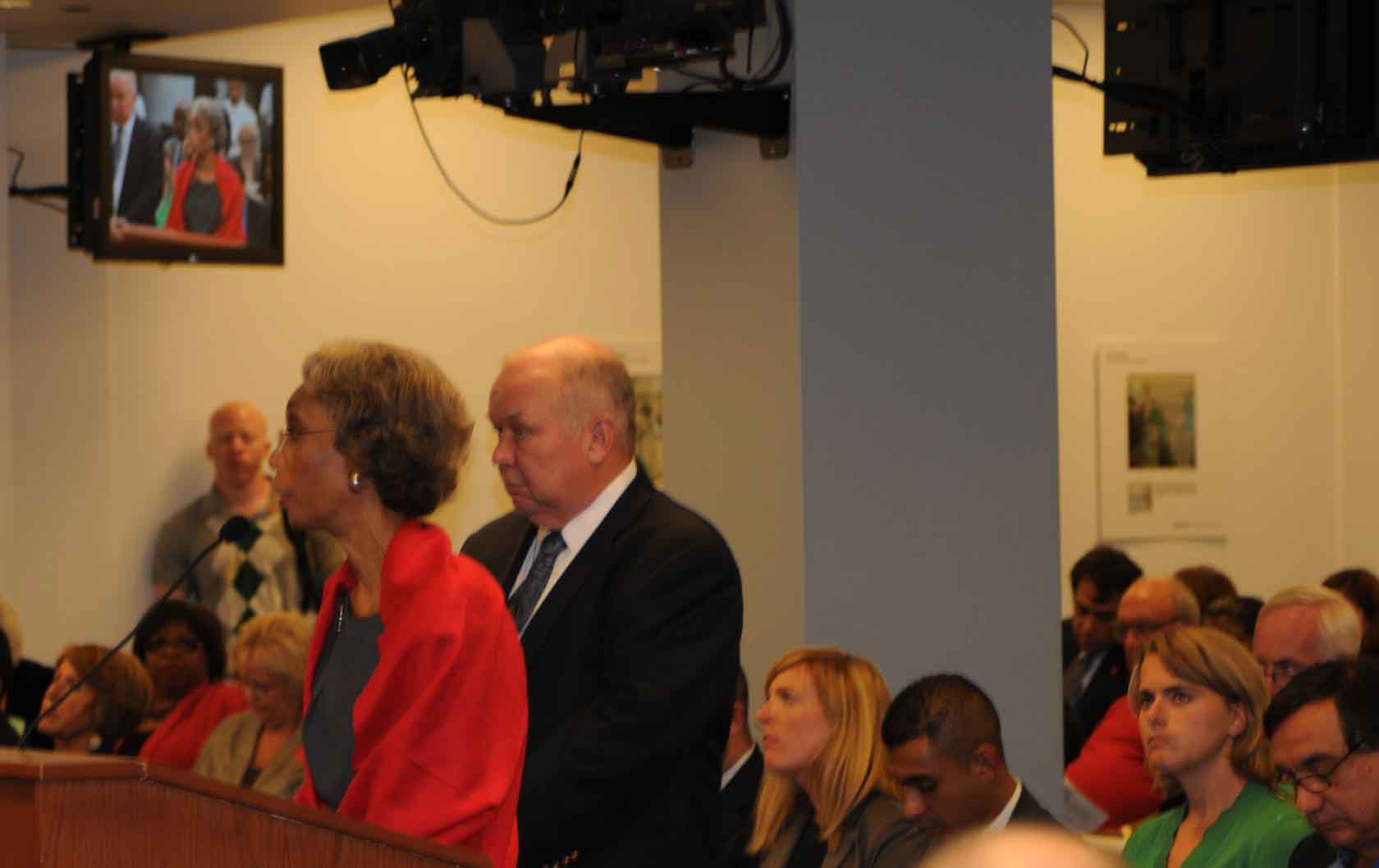 Clarice Berry (right above), President of the Chicago Principals and Administrators Association, returned to the Board of Education to complain publicly that CEO Ron Huberman is ignoring the principals as he develops plans. Standing with Berry is retired Mather High School Principal John Butterfield, who now works with the principals association and with the Retired Teachers Association of Chicago. Substance photo by George N. Schmidt.Although the Chicago Board of Education allows public officials and certain other officials (including the presidents of the principals and teachers unions) to jump to the front of the line when public participation finally begins, the time for public participation includes the public officials, thereby cutting back the time left for everyone else, including those who had waited for hours in line to sign up and get on the official agenda.
Clarice Berry (right above), President of the Chicago Principals and Administrators Association, returned to the Board of Education to complain publicly that CEO Ron Huberman is ignoring the principals as he develops plans. Standing with Berry is retired Mather High School Principal John Butterfield, who now works with the principals association and with the Retired Teachers Association of Chicago. Substance photo by George N. Schmidt.Although the Chicago Board of Education allows public officials and certain other officials (including the presidents of the principals and teachers unions) to jump to the front of the line when public participation finally begins, the time for public participation includes the public officials, thereby cutting back the time left for everyone else, including those who had waited for hours in line to sign up and get on the official agenda.
Gunsaulus and tyrant principals
After the preliminaries and the public officials, the first speakers when public participation began were from Gunsaulus Elementary school. They continue to demand the ouster of their principal who they claim has created a hostile environment. Schools chief instructional officer Barbara Eason Watkins said they are trying to reconcile the differences. Scott said if nothing else works he would agree to a third party mediator.
The two speakers from Gunsaulus challenged the Board to do something about their Principal, Amy Kotz, and the behavior of the local school council. Speaking again on the problems at Gunsualus were Gariela Suarez and Neal Suwe. Gunsaulus is one of five CPS schools where teachers and parents have charged the principals are running the schools in tyrannical way. The others that have come to public attention are Coonley, Prescott and Field on the north side and Brooks High School on the far south side. While other schools' staffs and parents have been having difficulty with principals who seem to be megalomaniacs, the ones most publicly criticized are those listed here. Gunsaulus has the distinction of having forced the blog "District 299.com" to open two additional pages after more than 800 comments were posted on the first blog discussion.
Once again, Scott told the Gunsaulus parents that the Board's hands were tied because the LSC has hired the principal.
Later in the meeting, Scott voted to fire two CPS principals following the Board's secret executive session. Scott made no mention of the possibility during his back-and-forth with the Gunsaulus parents.
University of Illinois Professor challenges Board to recoup money from TIFs
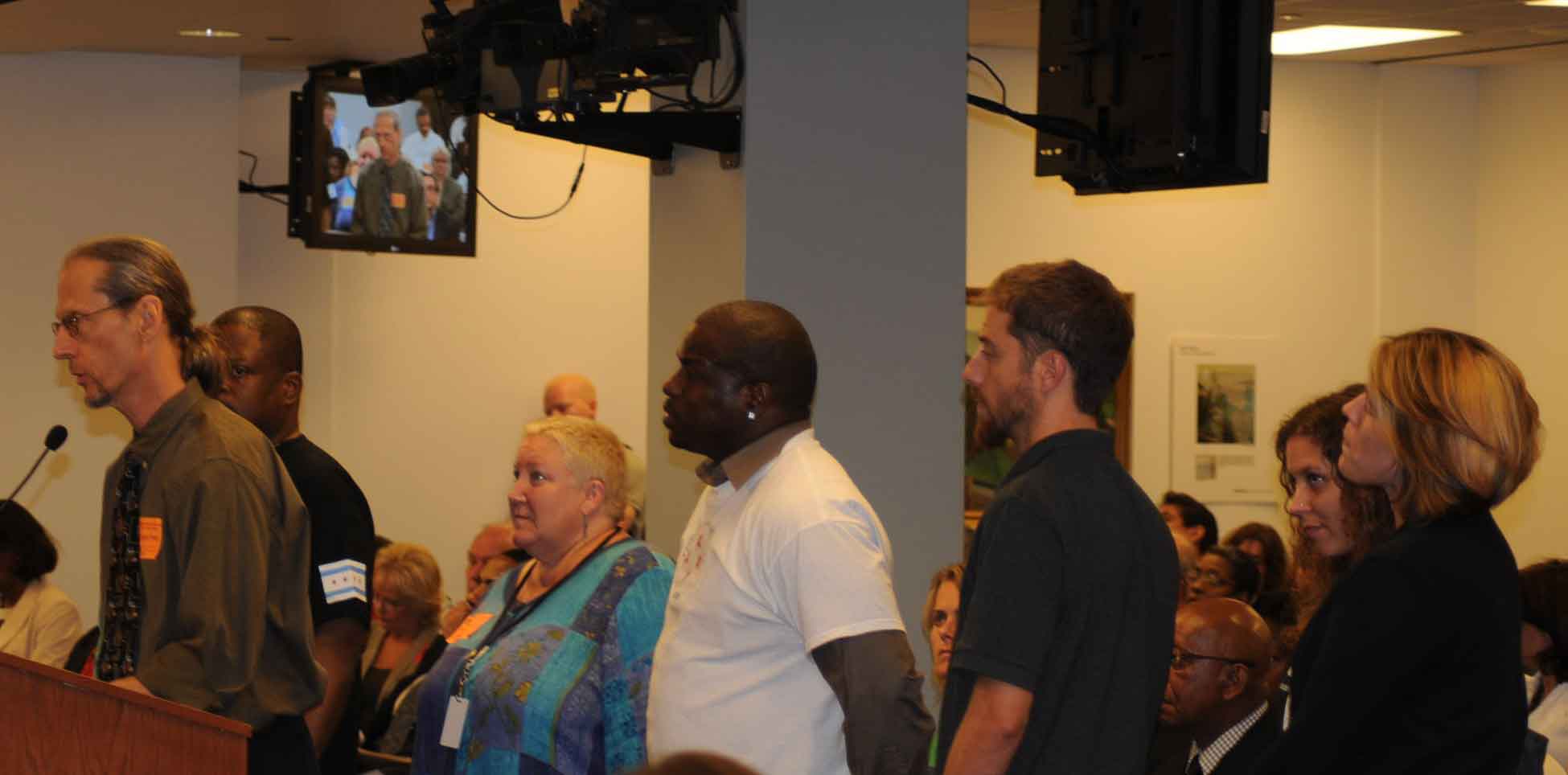 Flanked by friends from CORE, GEM, and PURE, University of Illinois professor and Teachers for Social Justice founder Rico Gutstein (above left at microphone) demanded to know why the Board of Education was allowing the mayor to siphon off millions of dollars from the Board of Education budget and put the money into Tax Increment Financing (TIF) districts across Chicago. The Board members gave no answer, then proceeded to vote unanimously and without debate to approve the controversial budget for 2009-2010.
Flanked by friends from CORE, GEM, and PURE, University of Illinois professor and Teachers for Social Justice founder Rico Gutstein (above left at microphone) demanded to know why the Board of Education was allowing the mayor to siphon off millions of dollars from the Board of Education budget and put the money into Tax Increment Financing (TIF) districts across Chicago. The Board members gave no answer, then proceeded to vote unanimously and without debate to approve the controversial budget for 2009-2010.
Rico Gutstein, a UIC professor and co-founder of Teachers for Social Justice, said that while half of the city’s $1 billion TIF fund reserve is committed to new projects, a certain amount of that money should have gone to relieve the CPS budget deficit. A "TIF" is a Tax Increment Financing District in which the city will freeze any future increase in tax monies that would go to the schools, parks and other city services to spur economic development.
According to Gutstein, in 2006 $2.5 billion in TIF has been accumulated, 55% of which should have gone to the schools. “That’s $535 million taken from the kids,” Gutstein charged.
Scott chose to say nothing in return to defend one key mechanism Mayor Richard Daley is using to finance his bid for the 2016 summer Olympics.
Special Education services questione
Rodney Estvan from Access Living of Chicago who monitors the special education services, told the Board that because of the problems with the way information was presented in the Proposed Budget for 2009 - 2010 he was unable to complete his annual budget analysis in time for the meeting. Estvan told the Board that there was a major question about how many teachers were assigned to special education instruction, and that the budget was unclear. Estvan also repeated a suggestion that he had made in the past. He said that they should re-establish a public budget audit committee because "the numbers don’t add up."
He said using stimulus dollars to pay salaries is creating a “funding cliff” and said the city should have asked for the full 4% levy in increased taxes to finance the deficit.
Civic Federation allowed to speak even though they did not sign up
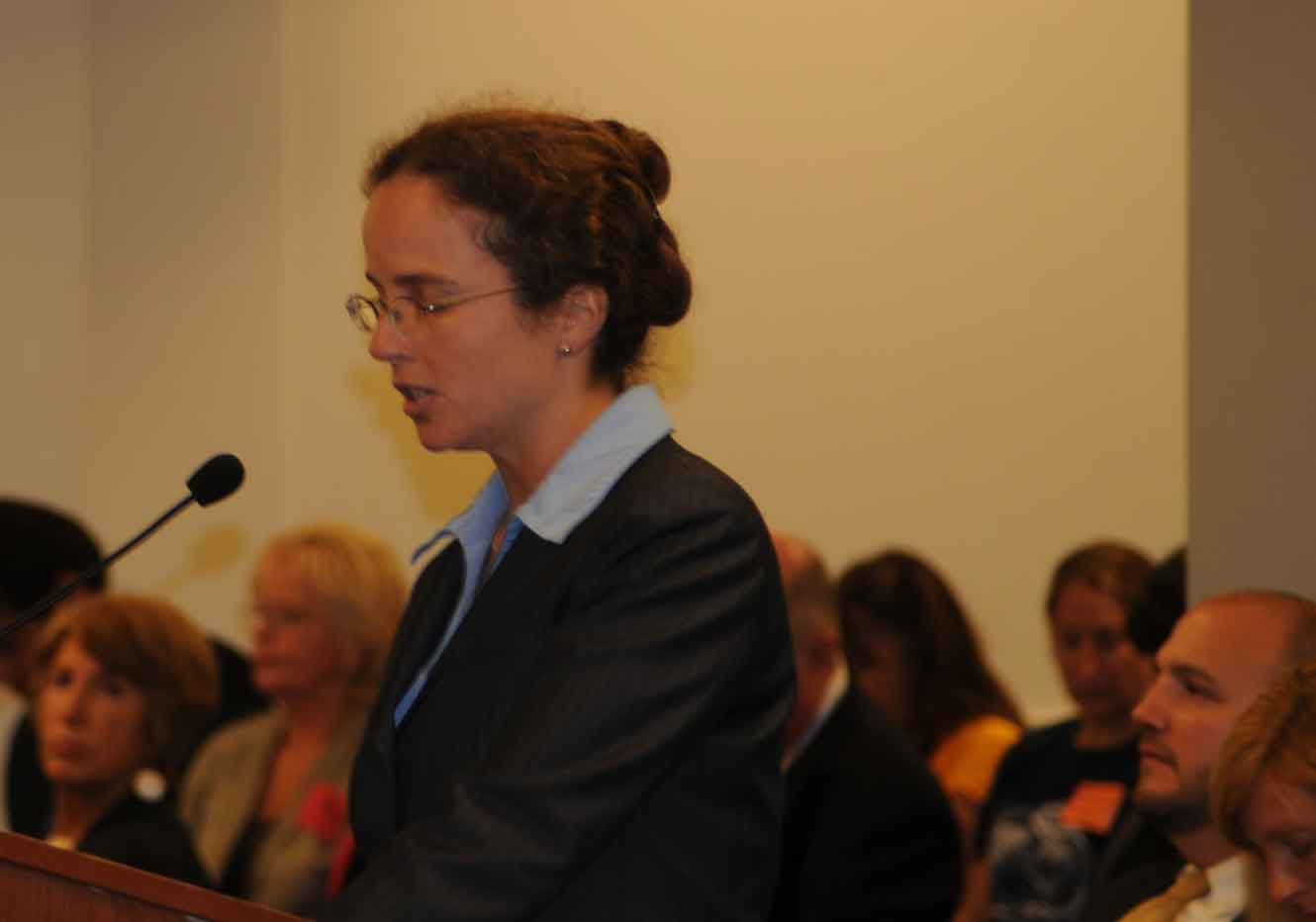 Sixty-six people had waited in line for more than two hours to sign up to speak at the August 26, 2009 meeting of the Chicago Board of Education. At least 15 of those people were told to go home after Board President Michael Scott abruptly terminated the public participation portiion of the meeting at 6:30 p.m. Lise Valentine (above) was not one of those signed up to speak. Nor was she a public official like Alderman Tom Allen. Public officials are given the courtesy of being allowed to address the Board early. Ms. Valenine, above, came to the meeting late and was allowed to speak without signing in because she was from the Civic Federation and had come to deliver a controversial endorsement of the Board's budget, which was on the meeting's agenda. More than a half dozen speakers who had signed up to offer criticisms of the budget were cut off before they were allowed to speak, and the Board members later approved the budget without discussion or debate. Substance photo by George N. Schmidt.Then, though not on the list to speak, Lise Valentine from the Civic Federation was given the floor by Michael Scott and praised the budget. She said she supports the current budget to close the $475 million "deficit". She supported the CPS position that the growing pension costs are a drain on the budget and must be reigned in, when the stimulus money dries up in two years and the schools under-enrollment necessitates more personnel cuts.
Sixty-six people had waited in line for more than two hours to sign up to speak at the August 26, 2009 meeting of the Chicago Board of Education. At least 15 of those people were told to go home after Board President Michael Scott abruptly terminated the public participation portiion of the meeting at 6:30 p.m. Lise Valentine (above) was not one of those signed up to speak. Nor was she a public official like Alderman Tom Allen. Public officials are given the courtesy of being allowed to address the Board early. Ms. Valenine, above, came to the meeting late and was allowed to speak without signing in because she was from the Civic Federation and had come to deliver a controversial endorsement of the Board's budget, which was on the meeting's agenda. More than a half dozen speakers who had signed up to offer criticisms of the budget were cut off before they were allowed to speak, and the Board members later approved the budget without discussion or debate. Substance photo by George N. Schmidt.Then, though not on the list to speak, Lise Valentine from the Civic Federation was given the floor by Michael Scott and praised the budget. She said she supports the current budget to close the $475 million "deficit". She supported the CPS position that the growing pension costs are a drain on the budget and must be reigned in, when the stimulus money dries up in two years and the schools under-enrollment necessitates more personnel cuts.
Huberman, who cut CTA pensions by raising the age of eligibility and increasing the employee contributions, has been saying that teacher pensions have necessitated raising property taxes 1.5 percent.
PURE demands Board save $100 million by ending retention
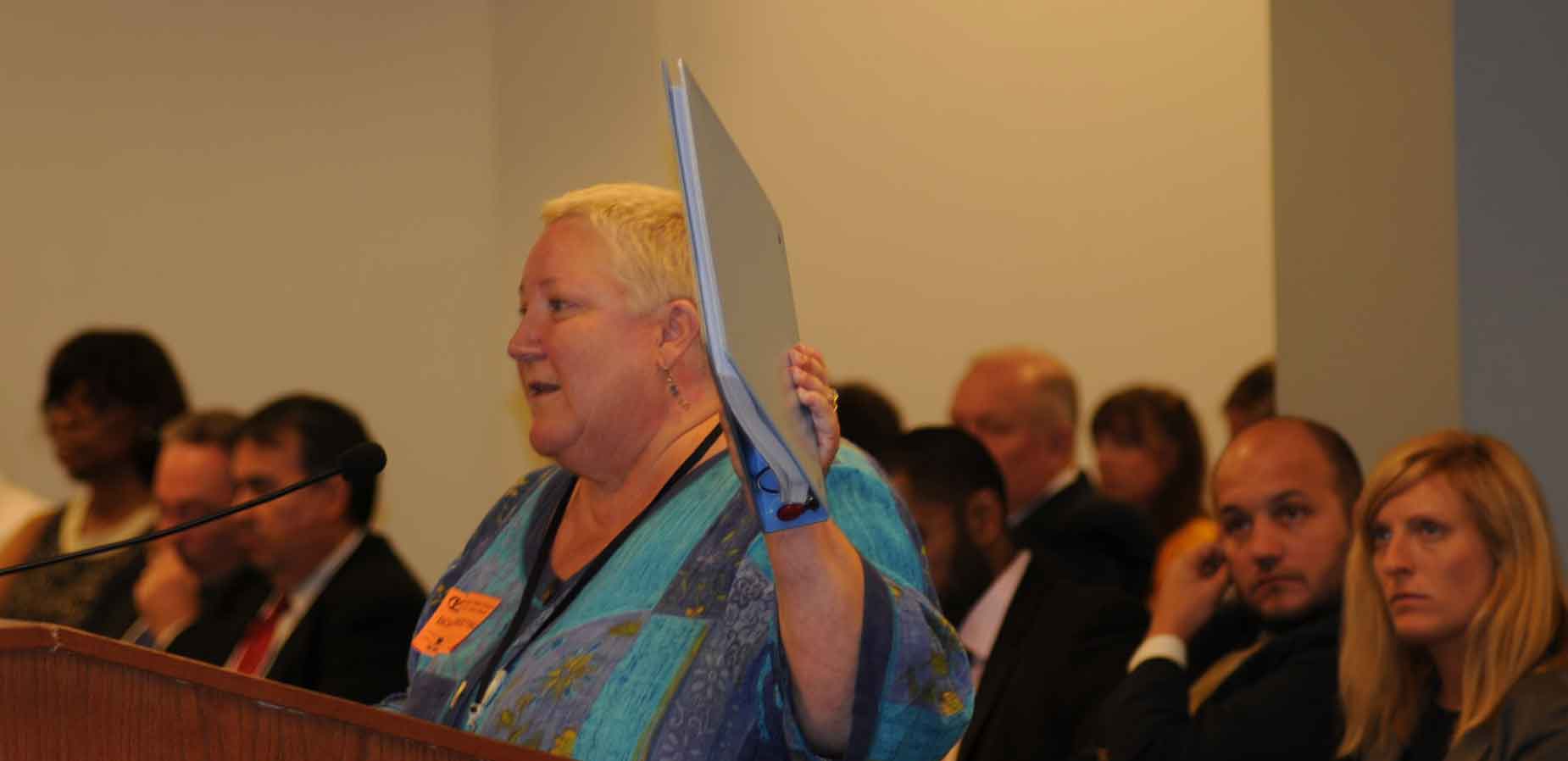 Julie Woestehoff, above, of PURE told the Board it could save $100 million by abolishing its failed policy of retention. Woestehoff is holding a notebook which she provided to all Board members outlining all of the academic research that shows that retention fails the children it is supposed to help and increases the dropout rate. Board member Norman Bobins engaged in a debate with Woestehoff, accusing her of wanting to "return to the policy of social promotion" (which CPS never had, but which has become a mainstay of the mythological history of CPS before mayoral control that is regularly repeated by Bobins and other corporate leaders). In response to Bobins, Woestehoff simply pointed out that not every issue has two "sides" despite what the Board of Education tries to do when it is simplifying complex realities and attempting to manipulate public debate. Substance photo by George N. Schmidt. Julie Woestenhoff, from Parents United for=2 0Responsible Education (PURE), told the Board that the perfect way to reduce the budget deficit would be to eliminate the current retention policy which holds back 10,000 students a year at a cost of $100 million. She said research shows it does not work and it is even harmful to students who will lose interest as a result.
Julie Woestehoff, above, of PURE told the Board it could save $100 million by abolishing its failed policy of retention. Woestehoff is holding a notebook which she provided to all Board members outlining all of the academic research that shows that retention fails the children it is supposed to help and increases the dropout rate. Board member Norman Bobins engaged in a debate with Woestehoff, accusing her of wanting to "return to the policy of social promotion" (which CPS never had, but which has become a mainstay of the mythological history of CPS before mayoral control that is regularly repeated by Bobins and other corporate leaders). In response to Bobins, Woestehoff simply pointed out that not every issue has two "sides" despite what the Board of Education tries to do when it is simplifying complex realities and attempting to manipulate public debate. Substance photo by George N. Schmidt. Julie Woestenhoff, from Parents United for=2 0Responsible Education (PURE), told the Board that the perfect way to reduce the budget deficit would be to eliminate the current retention policy which holds back 10,000 students a year at a cost of $100 million. She said research shows it does not work and it is even harmful to students who will lose interest as a result.
Woestehoff was interrupted by Board member Norman Bobins, retired CEO of Chicago's La Salle Bank (which he sold to Bank of America a few months before the financial collapse of most of America's major banks). Bonins demanded to know whether Woestehoff wanted to "return to social promotion." Woestehoff stared and Bobins and told him that there are often more than two "sides" to a complex problem, and that the choide wasn't between a failed policy of retention and a return to what the Board calls "social promotion."
Woestehoff presented the Board with a handout (available on the PURE Website) and a notebook with materials on the question of retention.
More horror stories about tyrant principals
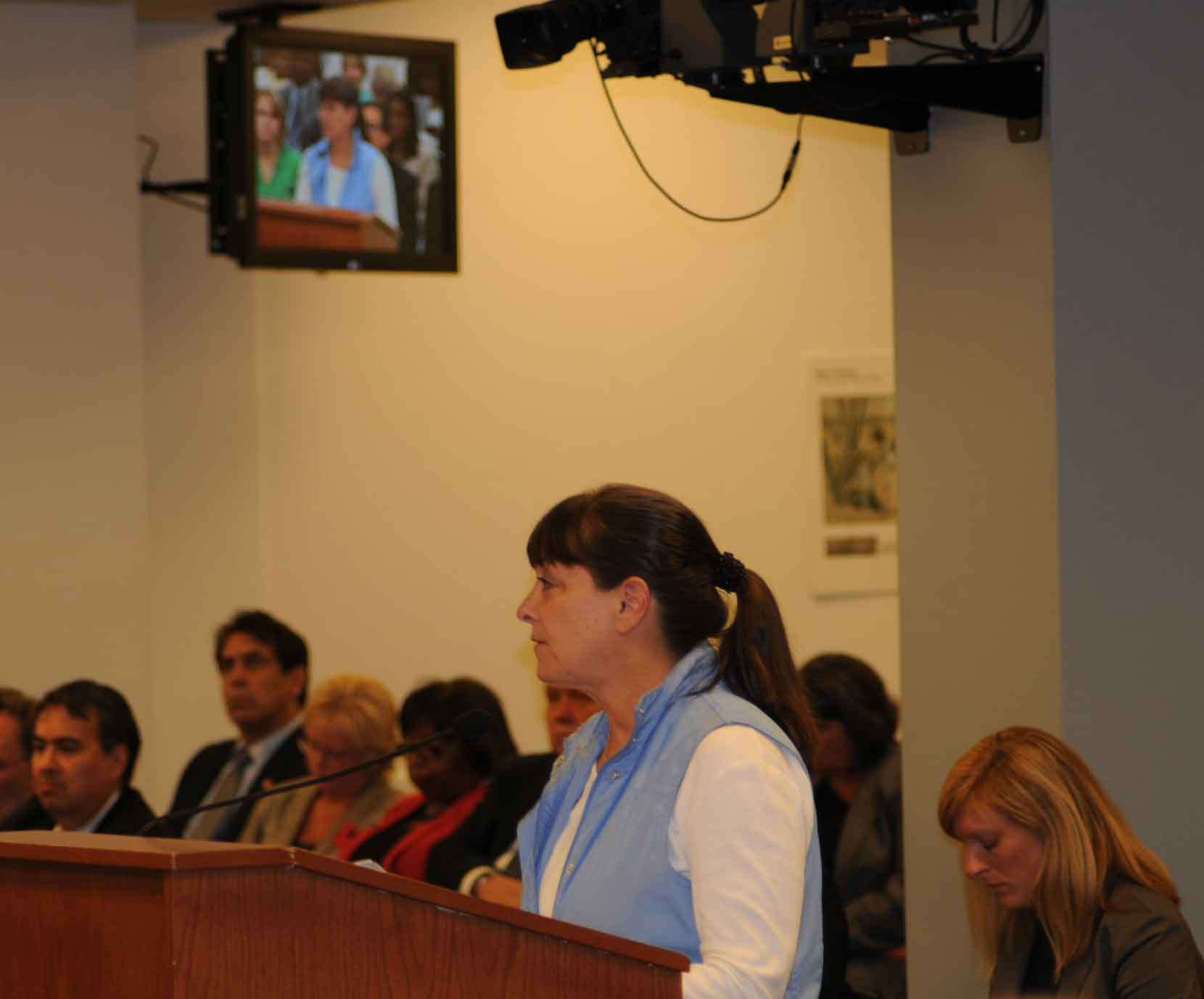 After noting that the CPS has an official "Wellness" policy, physical education teacher Linda Wallace (above) asked why the Chicago Board of Education allowed controversial Prescott Elementary School Principal Erin Roche to eliminate her position at the school and deprive the school's children of daily physical education, as required by Illinois law. Wallace learned that she was being dumped after years of teaching at Prescott by discovering that Roche had changed her position from a "1.0" (full-time) to a ".5" (half time) position. The Board members offered no answer to the affable presentation by Wallace, a veteran teacher who is now displaced. In the course of her remarks, Wallace pointed out that the Board's "wellness" policy is basically meaningless since principals like Roche are allowed to violate it on a daily basis with no accountability from CPS. Substance photo by George N. Schmidt.
After noting that the CPS has an official "Wellness" policy, physical education teacher Linda Wallace (above) asked why the Chicago Board of Education allowed controversial Prescott Elementary School Principal Erin Roche to eliminate her position at the school and deprive the school's children of daily physical education, as required by Illinois law. Wallace learned that she was being dumped after years of teaching at Prescott by discovering that Roche had changed her position from a "1.0" (full-time) to a ".5" (half time) position. The Board members offered no answer to the affable presentation by Wallace, a veteran teacher who is now displaced. In the course of her remarks, Wallace pointed out that the Board's "wellness" policy is basically meaningless since principals like Roche are allowed to violate it on a daily basis with no accountability from CPS. Substance photo by George N. Schmidt.
In addition to the Gunsaulus principal woes, the Prescott Elementary School horror story was back on the Board's agenda. The sage continued with displaced gym teacher, Linda Wallace, asking how embattled principal Erin Roche could cut her position to half time when state law mandates that children have 30 minutes of physical education every day, which amounts to 140 minutes per week. She told the Board she knew of two classes at Prescott that do not have gym class.
“Is this being monitored,” Wallace stated. “Mr. Scott, you are on the Olympic committee. What can you do about this?”
Again, Scott chose not to say anything in response. Scott recently came under fire for being on the Olympic committee while representing real estate that could increase in value from the games.
Stewart arrives late, ignores budget attacks on teachers, retirees
The president of the ChicagoTeachers Union Marilyn Stewart spoke about payroll problems, mentioning that a union official standing next to her who has not worked for CPS for 17 years was just issued a check for $700. She mentioned this in reference to the payroll problems CPS employees have been having with the Board's botched payroll systems.
"Someone's getting paid down here and it's not your employees," she said to gasps from the audience.
Pulaski elementary pickets, protests, over proposal to change school into an "IB School"
The last major challenge to the Board was one that began the Board’s rough day. A large contingent of parents, teachers and students from the Pulaski Elementary School as well as members of Core, a caucus in the Chicago Teachers Union, swarmed their two speakers. The public school is slated to be phased out because the community in Bucketown/Wicker Park wants an International Baccalaureate program and doesn’t feel this school suits the needs of the neighborhood.
The Pulaski group marched from their school to the Board headquarters, generating a lot of attention to their plight. In conjunction with GEM (Grassroots Education Movement) and CORE, they then held a press conference outside the building at 125 S. Clark Street before heading to the meeting.
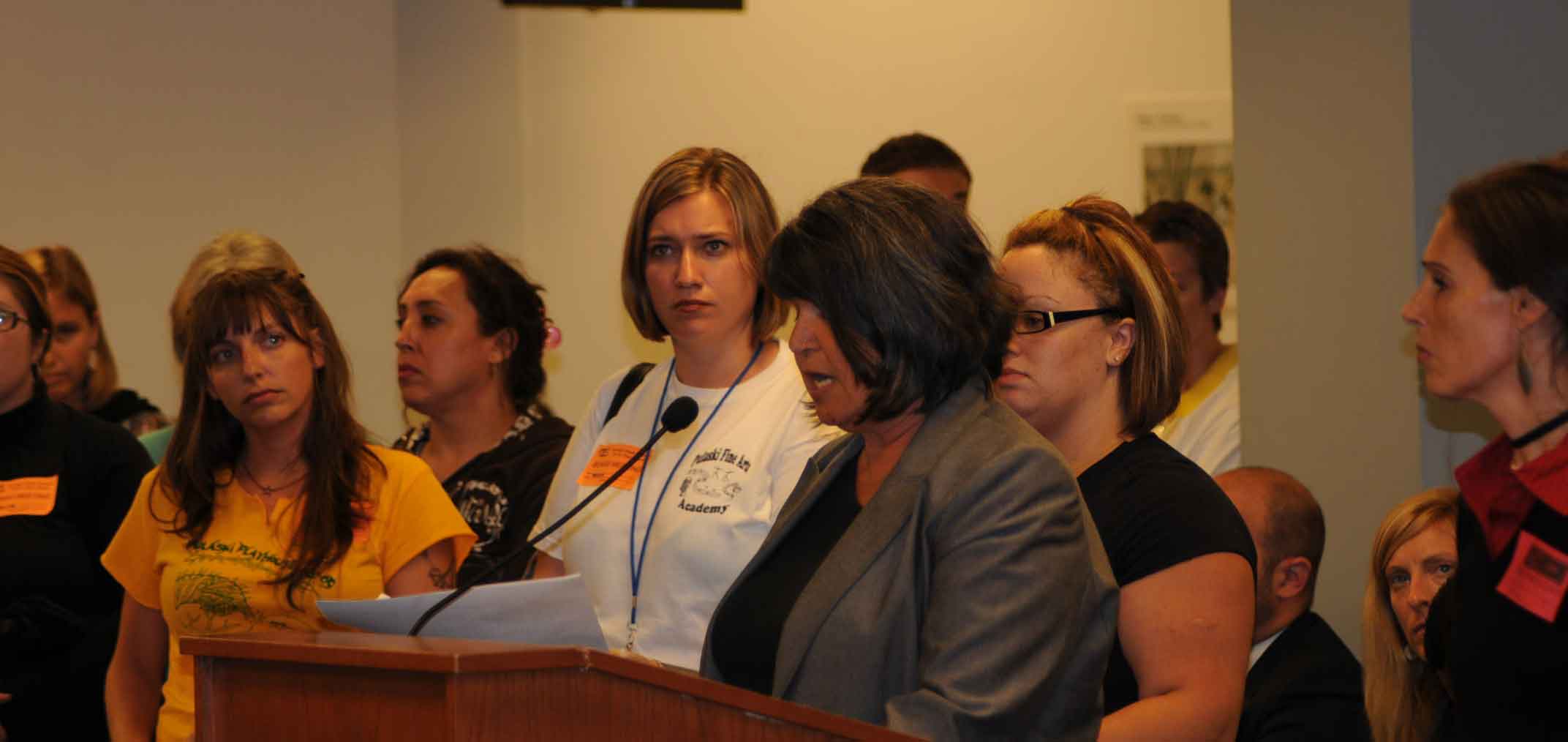 Flanked by teachers from her school, Pulaski's principal asked the Board why it was necessary to eliminate the current Pulaski Elementary School and establish a second school within the Pulaski building to house the IB program. The Board President had no answer. Substance photo by George N. Schmidt.The Pulaski principal said most students who live outside the attendance area choose to go to the school because it has high test scores and quality programs. Accusations of racism were bandied about when speakers noted that the overwhelming white contingent that wants a new school with college-level courses, is pitted against the neighborhood school which is more racially diverse, though predominantly Hispanic.
Flanked by teachers from her school, Pulaski's principal asked the Board why it was necessary to eliminate the current Pulaski Elementary School and establish a second school within the Pulaski building to house the IB program. The Board President had no answer. Substance photo by George N. Schmidt.The Pulaski principal said most students who live outside the attendance area choose to go to the school because it has high test scores and quality programs. Accusations of racism were bandied about when speakers noted that the overwhelming white contingent that wants a new school with college-level courses, is pitted against the neighborhood school which is more racially diverse, though predominantly Hispanic.
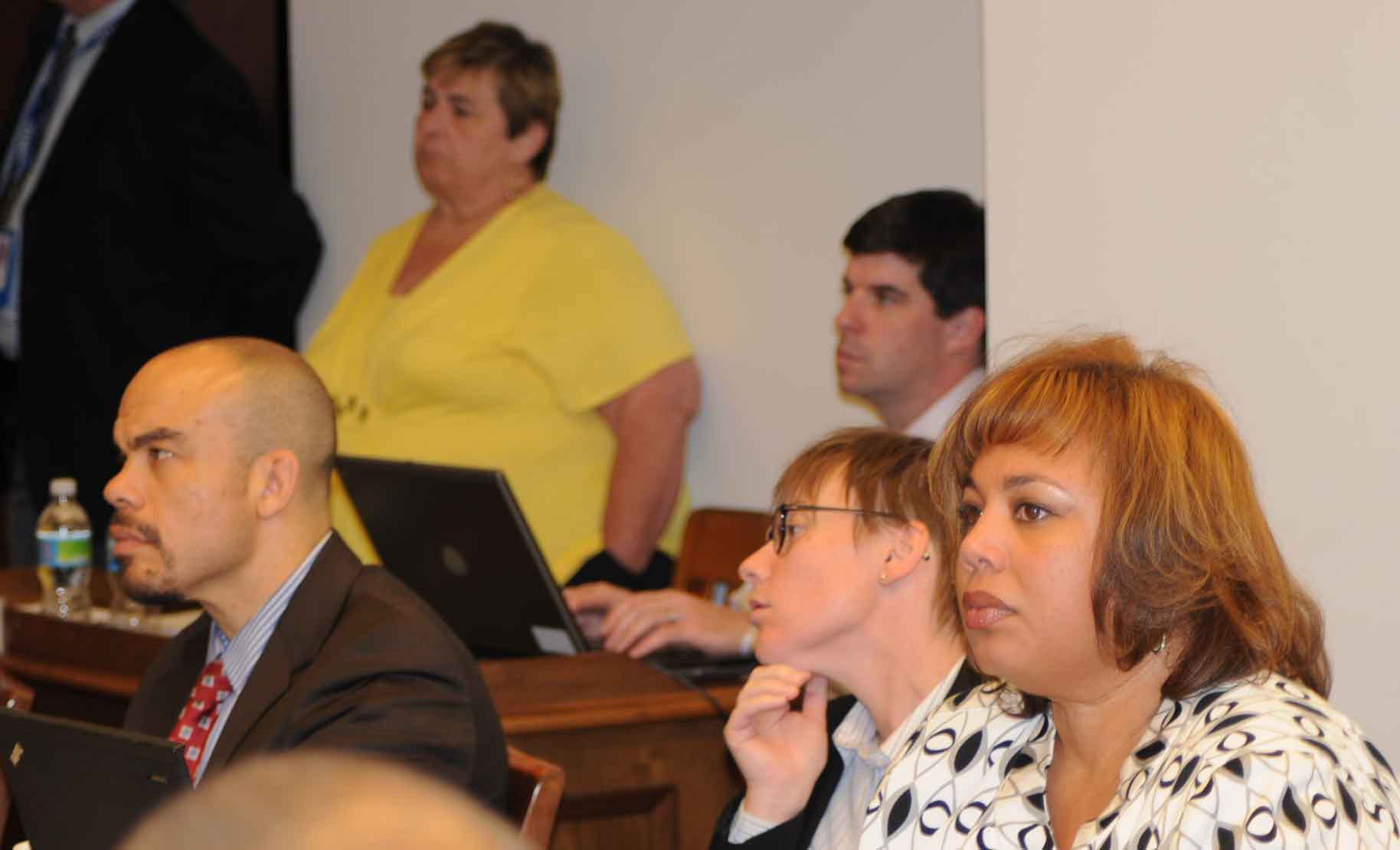 While the Pulaski discussion was taking place, Board President Michael Scott deliberately did not ask Josh Edelman (above) of the Office of New Schools to explain why the "New Schools" office had encouraged the Bucktown Parents organization to demand a separate "school" for the IB program. Nor did the Board ask how having two principals within one school could constitute efficient management under the new guidance of Sarah Kremsner (above with hand on chin) who has just been appointed to head the newly created "Office of Performance Management" with a first year budget of $5 million. CEO Ron Huberman has expanded large portions of the new bureaucracy while talking about "cost efficiencies". Two departments within the CPS bureaucracy which are being expanded in both personnel and power are Edelman's "Office of New Schools" and Kremsner's "Office of Performance Management" (which never existed before and which will cost the city more than $5 million within the next ten months). Substance photo by George N. Schmidt.The solution, Pulaski supporters say, would be to combine the two schools rather than divide the two groups. After two speakers spoke in favor of continuing Pulaski as a neighborhood school, a lady identifying herself as leader of a group of "500 Bucktown Residents" said that the school should be changed into an IB academy.
While the Pulaski discussion was taking place, Board President Michael Scott deliberately did not ask Josh Edelman (above) of the Office of New Schools to explain why the "New Schools" office had encouraged the Bucktown Parents organization to demand a separate "school" for the IB program. Nor did the Board ask how having two principals within one school could constitute efficient management under the new guidance of Sarah Kremsner (above with hand on chin) who has just been appointed to head the newly created "Office of Performance Management" with a first year budget of $5 million. CEO Ron Huberman has expanded large portions of the new bureaucracy while talking about "cost efficiencies". Two departments within the CPS bureaucracy which are being expanded in both personnel and power are Edelman's "Office of New Schools" and Kremsner's "Office of Performance Management" (which never existed before and which will cost the city more than $5 million within the next ten months). Substance photo by George N. Schmidt.The solution, Pulaski supporters say, would be to combine the two schools rather than divide the two groups. After two speakers spoke in favor of continuing Pulaski as a neighborhood school, a lady identifying herself as leader of a group of "500 Bucktown Residents" said that the school should be changed into an IB academy.
In keeping with its policy of believing there are two (and only two) "sides" to every debate, Board President Michael Scott then allowed the final speaker, who said she was representing 500 families in the area.
Scott then called on the lone person who had signed up to speak in favor of replacing the existing Pulaski with an all-IB school.
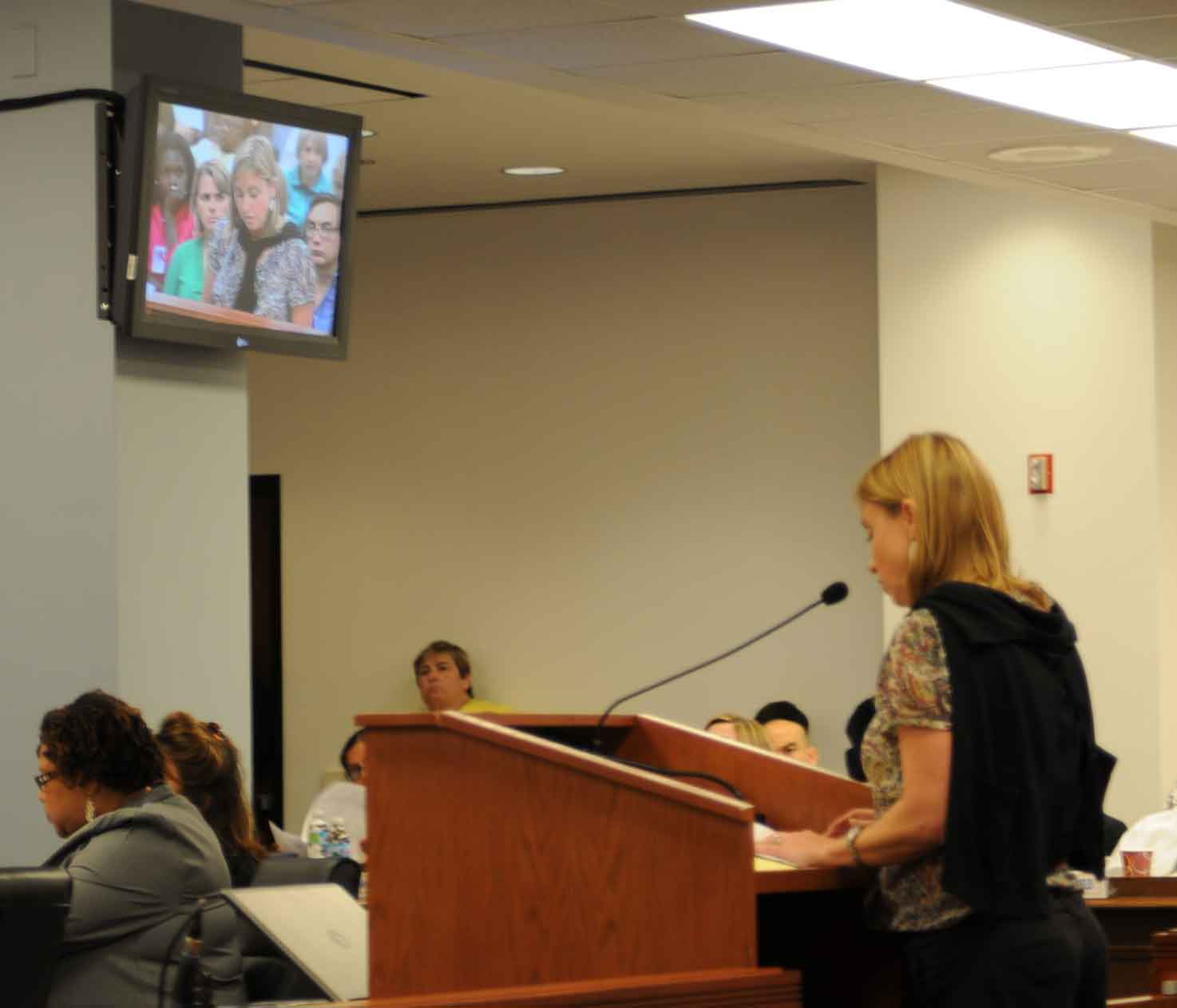 Christina Nelson (above, at microphone) told the Board that she represented "Bucktown Neighbors" a group she said had 500 members. According to Nelson, the reason why the IB program had to be a separate school within Pulaski, until Pulaski was phased out, was that the current teachers, principal and students at Pulaski did not share the "high standards" of her group. She told the Board that they wanted to get rid of the principal and existing teachers so that a new group who would promote the higher standards of the IB program could eventually be put into action under a new principal who understood how to create high standards. Substance photo by George N. Schmidt.Christina Nelson told the Board that she represented "Bucktown Neighbors" a group she said had 500 members. According to Nelson, the reason why the IB program had to be a separate school within Pulaski, until Pulaski was phased out, was that the current teachers, principal and students at Pulaski did not share the "high standards" of her group. She told the Board that they wanted to get rid of the principal and existing teachers so that a new group who would promote the higher standards of the IB program could eventually be put into action under a new principal who understood how to create high standards.
Christina Nelson (above, at microphone) told the Board that she represented "Bucktown Neighbors" a group she said had 500 members. According to Nelson, the reason why the IB program had to be a separate school within Pulaski, until Pulaski was phased out, was that the current teachers, principal and students at Pulaski did not share the "high standards" of her group. She told the Board that they wanted to get rid of the principal and existing teachers so that a new group who would promote the higher standards of the IB program could eventually be put into action under a new principal who understood how to create high standards. Substance photo by George N. Schmidt.Christina Nelson told the Board that she represented "Bucktown Neighbors" a group she said had 500 members. According to Nelson, the reason why the IB program had to be a separate school within Pulaski, until Pulaski was phased out, was that the current teachers, principal and students at Pulaski did not share the "high standards" of her group. She told the Board that they wanted to get rid of the principal and existing teachers so that a new group who would promote the higher standards of the IB program could eventually be put into action under a new principal who understood how to create high standards.
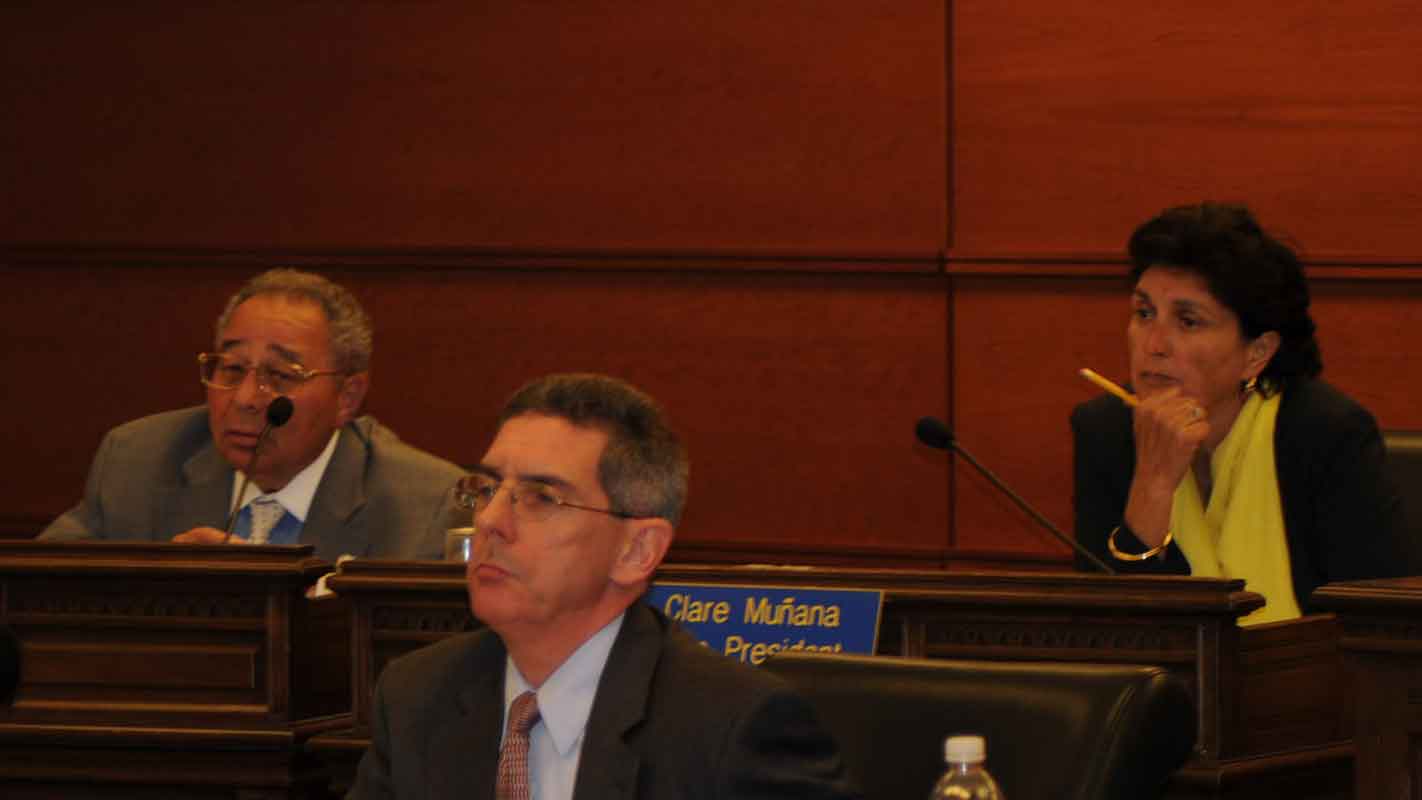 Retired La Salle Bank CEO Norman Bobins (above left) momentarily broke ranks with the silence acquiescence of his fellow Board members to ask why Pulaski had to be divided into two schools, when traditionally CPS had launched successful IB programs within existing schools. Bobins, who is usually one of the most prominent and outspoken supporters of the destruction of existing public schools under "Renaissance 2010", surprised some observers by asking critical questions about the issues that came before the Board before President Michael Scott abruptly ended public participation leaving 15 people without being given the right to speak. Substance photo by George N. Schmidt.Board member Norman Bobins asked her why they wanted to abolish the old schools and create a new one, when all other IB programs at CPS were doing fine in existing schools. She answered that she felt it was better if the community could get rid of the current teachers and principal and hire those who would be more in keeping with what she said were the community's standards.
Retired La Salle Bank CEO Norman Bobins (above left) momentarily broke ranks with the silence acquiescence of his fellow Board members to ask why Pulaski had to be divided into two schools, when traditionally CPS had launched successful IB programs within existing schools. Bobins, who is usually one of the most prominent and outspoken supporters of the destruction of existing public schools under "Renaissance 2010", surprised some observers by asking critical questions about the issues that came before the Board before President Michael Scott abruptly ended public participation leaving 15 people without being given the right to speak. Substance photo by George N. Schmidt.Board member Norman Bobins asked her why they wanted to abolish the old schools and create a new one, when all other IB programs at CPS were doing fine in existing schools. She answered that she felt it was better if the community could get rid of the current teachers and principal and hire those who would be more in keeping with what she said were the community's standards.
More than a dozen speakers simply cut off...
Once the discussion of Pulaski was ended, Michael Scott abruptly terminated public participation, despite the fact that at least 15 people who had waited in line to sign up four hours earlier were still waiting to speak. Scott did not even tell those he left out that the Board would take any information that they wished to present to the Board.
Among those eliminated from the public program by Scott were Hubert Jackson, who told Substance that he was going to update the Board on the scandals at Brooks College Prep High School; Teresa Fraga, who was going to speak about the history of the struggle for public schools in Pilsen; Elena Rios, who was going to remind the Board that Gallistel Elementary School was still being left out of the Board's capital development plans; Jackson Potter of CORE; Brian Roa, of Senn High School; Georgia Williams, who was going to speak on the terrible pressures on the overcrowded Black Magnet School; and Derrick Harris, a long time west side activist. Substance has asked a number of them to provide Substance News with the comments they had prepared before they were cut off, and the topics will be addressed here where possible.
The speakers who were cut off noted that in many cases they had spent hours waiting in line in the lobby of the CPS headquarters while many of those who were allowed to speak had simply been placed in front of the line. Most notable among those was the speaker from the Civic Federation, who did not sign up to speak and then was suddenly recognized to speak by Michael Scott because she was speaking in favor of the Board's budget narrative.
 By 1:30 p.m. when the above photo was taken, more than 80 people were standing in line to sign in to speak during the public participation portion of the Chicago Board of Education's August 26, 2009 meeting. (Not all those in line signed up, and some, such as Alderman James Balcer, 10th Ward, who is standing under the "S" in the Radio Shack sign went on to speak). The line above overflowed the guides and back up into the hallway adjacent to the Radio Shack (above), forcing CPS security to constantly ask those who were waiting to sign in to create space for public access and egress. Despite the clear guidelines CPS supposedly follows, on six separate occasions Board President Michael Scott simply ignored procedure and violated the rights of those who waited to speak, finally cutting off the public participation with 15 people remaining. Among those who were allowed to speak without signing up was Lise Valentine of the Civic Federation, who praised the Board's budget and repeated the Board's claim that teacher pension costs were a danger to future budgets. Scott also allowed the speaker from UNO to ignore the call for him to speak until UNO executive director Juan Rangel had arrived. The refusal of the Chicago Board of Education to hold its meetings in communities and schools across the city, as was once done, coupled with the manipulation of the public participation portion of the meeting is leading to increased anger across Chicago, an anger that almost resulted in outbursts on August 26 when Michael Scott ignored more than a dozen people who had been waiting all day to speak to the Board about important issues. Substance photo by George N. Schmidt. As soon as public participation was terminated, the Board heard a presentation by Ron Huberman that was identical except in one aspect to the budget presentations that had been held amid great criticism on August 17, 18, and 19 across the city. The Board members did not read the transcript of the criticisms of the budget they were about to vote on, according to informed sources. After deliberating for over an hour in closed session, the Board came out and voted quickly to approve the budget and the rest of its agenda without discussion or debate, then adjourn.
By 1:30 p.m. when the above photo was taken, more than 80 people were standing in line to sign in to speak during the public participation portion of the Chicago Board of Education's August 26, 2009 meeting. (Not all those in line signed up, and some, such as Alderman James Balcer, 10th Ward, who is standing under the "S" in the Radio Shack sign went on to speak). The line above overflowed the guides and back up into the hallway adjacent to the Radio Shack (above), forcing CPS security to constantly ask those who were waiting to sign in to create space for public access and egress. Despite the clear guidelines CPS supposedly follows, on six separate occasions Board President Michael Scott simply ignored procedure and violated the rights of those who waited to speak, finally cutting off the public participation with 15 people remaining. Among those who were allowed to speak without signing up was Lise Valentine of the Civic Federation, who praised the Board's budget and repeated the Board's claim that teacher pension costs were a danger to future budgets. Scott also allowed the speaker from UNO to ignore the call for him to speak until UNO executive director Juan Rangel had arrived. The refusal of the Chicago Board of Education to hold its meetings in communities and schools across the city, as was once done, coupled with the manipulation of the public participation portion of the meeting is leading to increased anger across Chicago, an anger that almost resulted in outbursts on August 26 when Michael Scott ignored more than a dozen people who had been waiting all day to speak to the Board about important issues. Substance photo by George N. Schmidt. As soon as public participation was terminated, the Board heard a presentation by Ron Huberman that was identical except in one aspect to the budget presentations that had been held amid great criticism on August 17, 18, and 19 across the city. The Board members did not read the transcript of the criticisms of the budget they were about to vote on, according to informed sources. After deliberating for over an hour in closed session, the Board came out and voted quickly to approve the budget and the rest of its agenda without discussion or debate, then adjourn.

